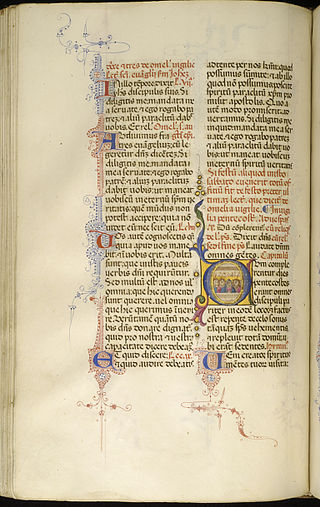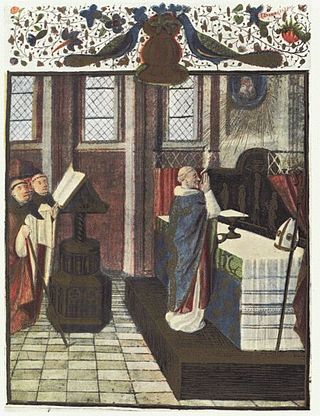The Apostles' Creed, sometimes titled the Apostolic Creed or the Symbol of the Apostles, is a Christian creed or "symbol of faith".

The Roman Breviary is a breviary of the Roman Rite in the Catholic Church. A liturgical book, it contains public or canonical prayers, hymns, the Psalms, readings, and notations for everyday use, especially by bishops, priests, and deacons in the Divine Office.

The Eucharist, also known as Holy Communion, Blessed Sacrament and the Lord's Supper, is a Christian rite that is considered a sacrament in most churches, and as an ordinance in others. Christians believe that the rite was instituted by Jesus at the Last Supper, the night before his crucifixion, giving his disciples bread and wine. Passages in the New Testament state that he commanded them to "do this in memory of me" while referring to the bread as "my body" and the cup of wine as "the blood of my covenant, which is poured out for many". According to the Synoptic Gospels this was at a Passover meal.

Mass is the main Eucharistic liturgical service in many forms of Western Christianity. The term Mass is commonly used in the Catholic Church, Western Rite Orthodoxy, Old Catholicism, and Independent Catholicism. The term is also used in some Lutheran churches, as well as in some Anglican churches, and on rare occasion by other Protestant churches.

Anglo-Catholicism comprises beliefs and practices that emphasise the catholic heritage and identity of the various Anglican churches.

Advent is a season observed in most Christian denominations as a time of expectant waiting and preparation for both the celebration of the Nativity of Christ at Christmas and the return of Christ at the Second Coming. Advent is the beginning of the liturgical year in Western Christianity. The name was adopted from Latin adventus "coming; arrival", translating Greek parousia from the New Testament, originally referring to the Second Coming.

In the practice of Christianity, canonical hours mark the divisions of the day in terms of fixed times of prayer at regular intervals. A book of hours, chiefly a breviary, normally contains a version of, or selection from, such prayers.

Making the sign of the cross, or blessing oneself or crossing oneself, is a ritual blessing made by members of some branches of Christianity. This blessing is made by the tracing of an upright cross or Greek cross across the body with the right hand, often accompanied by spoken or mental recitation of the Trinitarian formula: "In the name of the Father, and of the Son, and of the Holy Spirit. Amen."

Compline, also known as Complin, Night Prayer, or the Prayers at the End of the Day, is the final prayer liturgy of the day in the Christian tradition of canonical hours, which are prayed at fixed prayer times.

Matins is a canonical hour in Christian liturgy, originally sung during the darkness of early morning.
Christian liturgy is a pattern for worship used by a Christian congregation or denomination on a regular basis. The term liturgy comes from Greek and means "public work". Within Christianity, liturgies descending from the same region, denomination, or culture are described as ritual families.

The Liturgy of the Hours, Divine Office, or Opus Dei are a set of Catholic prayers comprising the canonical hours, often also referred to as the breviary, of the Latin Church. The Liturgy of the Hours forms the official set of prayers "marking the hours of each day and sanctifying the day with prayer." The term "Liturgy of the Hours" has been retroactively applied to the practices of saying the canonical hours in both the Christian East and West–particularly within the Latin liturgical rites–prior to the Second Vatican Council, and is the official term for the canonical hours promulgated for usage by the Latin Church in 1971. Before 1971, the official form for the Latin Church was the Breviarium Romanum, first published in 1568 with major editions through 1962.
A prayer book is a book containing prayers and perhaps devotional readings, for private or communal use, or in some cases, outlining the liturgy of religious services. Books containing mainly orders of religious services, or readings for them are termed "service books" or "liturgical books", and are thus not prayer-books in the strictest sense, but the term is often used very loosely. A religion's scriptures might also be considered prayer books as well.

Anglican devotions are private prayers and practices used by Anglican Christians to promote spiritual growth and communion with God. Among members of the Anglican Communion, private devotional habits vary widely, depending on personal preference and on their affiliation with low-church or high-church parishes.

A daily devotional is a religious publication that provides a specific spiritual reading for each calendar day. Many daily devotionals take the form of one year devotional books, with many being tailored specifically for children, teenagers, students, men and women.

A liturgical book, or service book, is a book published by the authority of a church body that contains the text and directions for the liturgy of its official religious services.
Evangelisch-Lutherische Gebetsbruderschaft is a German Lutheran religious society for men and women, based on the doctrines of the Bible and Book of Concord, with regular prayer for the renewal and unity of the Church.

Christian prayer is an important activity in Christianity, and there are several different forms used for this practice.

A sacrament is a Christian rite that is recognized as being particularly important and significant. There are various views on the existence, number and meaning of such rites. Many Christians consider the sacraments to be a visible symbol of the reality of God, as well as a channel for God's grace. Many denominations, including the Roman Catholic, Lutheran, Presbyterian, Anglican, Methodist, and Reformed, hold to the definition of sacrament formulated by Augustine of Hippo: an outward sign of an inward grace, that has been instituted by Jesus Christ. Sacraments signify God's grace in a way that is outwardly observable to the participant.

A breviary is a liturgical book used in Christianity for praying the canonical hours, usually recited at seven fixed prayer times.
















